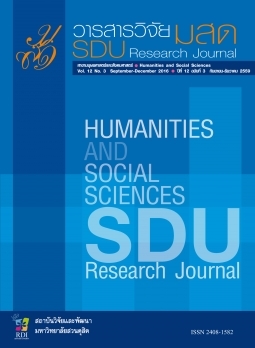การพัฒนาบทเรียนตามสภาพแวดล้อมอีเลิร์นนิง เรื่อง การพัฒนาบุคลิกภาพในงานอาชีพ คหกรรมศาสตร์สำหรับนักศึกษาที่บกพร่องทางการได้ยิน มหาวิทยาลัยสวนดุสิต
Keywords:
e-Learning, Development Teaching Methods of e-Learning, Hearing Impaired Students, Higher EducationAbstract
The objectives of this study were to: 1) Study the e-Learning environment for
students who are hearing impaired, 2) Develop an e-Learning Environmental Model for
hearing impaired undergraduates to meet the 80/80 efficiency criterion, 3) Determine the
effectiveness index of the developed e-Learning model, 4) Investigate students’
satisfaction towards the developed e-Learning model, and 5) Study learning retention one
month after completing the course from the developed e-Learning model. The results
revealed the following: 1) The e-learning environment on personality development for
home economics careers for hearing impaired undergraduates students of Suan Dusit
University is comprised of 13 components: (1) The first week orientation video with sign
language interpreters; (2) Teaching plans available for download; (4) A pretest online;
(5) Video teaching: Screen language Interpreter, scrolling subtitles, picture or media,
hypertext or hyperlink; (6) Weekly lecture notes available for download; (7) Textbook and
documents for teaching available for download; (8) PowerPoint or media teaching
available for download; (9) Student activity video and comments; (10) Posttest online;
(11) Homework online; (12) Online evaluation that students can check; and
(13) Post-training for the last week. 2) The efficiency of the e-Learning environments model
was 80.72/81.16. 3) The effectiveness index of the developed e-Learning model was 69%.
4) The average students’ satisfaction towards the developed e-learning model was at a
high level (χ
= 3.61) and 5) The learning retention of experimental group students was
not significantly different between the first and the second test results.
References
เครือข่ายอินเทอร์เน็ต ของนักศึกษาระดับปริญญาตรี มหาวิทยาลัยรามคำแหง. กรุงเทพฯ:
มหาวิทยาลัยรามคำแหง.
กนกพร ฉันทนารุ่งภักดิ์. (2548). การพัฒนารูปแบบการเรียนบนเว็บแบบผสมผสานด้วยการเรียนการสอน
แบบร่วมมือในกลุ่มการเรียนรู้คณิตศาสตร์ของนักเรียนชั้นประถมศึกษาตอนปลาย (วิทยานิพนธ์
ปริญญามหาบัณฑิต). กรุงเทพฯ: จุฬาลงกรณ์มหาวิทยาลัย.
จงกลนี วีระเศรษฐกุล และคณะ. (2552). รายงานการประเมิน โครงการโรงเรียนต้นแบบ: การทดลองสอน
แบบ สองภาษาสำหรับเด็กหูหนวก. กรุงเทพฯ: สำนักบริหารงานการศึกษาพิเศษ สำนักงาน
คณะกรรมการการศึกษาขั้นพื้นฐานกับวิทยาลัยราชสุดา มหาวิทยาลัยมหิดล.
จิตประภา ศรีอ่อน. (2544). ประวัติการจัดการศึกษาของคนหูหนวกในประเทศไทย (ปริญญานิพนธ์ปริญญา
ดุษฎีบัณฑิต). ประเทศออสเตรเลีย: มหาวิทยาลัยลาโทรบ.
จิรศักดิ์ อุดหนุน. (2550). การนำเสนอรูปแบบการเรียนการสอนแบบร่วมมือบนเว็บ วิชาการประพันธ์เพลง
สำหรับนิสิต นักศึกษาระดับปริญญาบัณฑิต ระดับอุดมศึกษาต่างสถาบัน (ปริญญานิพนธ์ปริญญา
ดุษฎีบัณฑิต). กรุงเทพฯ: จุฬาลงกรณ์มหาวิทยาลัย.
ฉัตรชัย บุษบงค์. (2548). การพัฒนาบทเรียนคอมพิวเตอร์ช่วยสอน คำศัพท์ ภาษามือทางการศึกษาพิเศษ
สำหรับนักศึกษาชั้นปีที่ 1 โปรแกรมวิชาการศึกษาพิเศษ คณะครุศาสตร์ สถาบันราชภัฏสวนดุสิต.
วารสารวิจัย มสด สาขามนุษยศาสตร์และสังคมศาสตร์, 1(1), 79.
ฐิติยา เนตรวงษ์ และบุญญลักษม์ ตำนานจิตร. (2555). การเรียนร่วมกันแบบผสมผสานและใช้โครงงานเป็น
ฐานที่ส่งผลต่อการสร้างความรู้ และผลสัมฤทธิ์ทางการเรียน. วารสารวิจัย มสด สาขา
มนุษยศาสตร์และสังคมศาสตร์, 8(3), 1-11.
ประหยัด ทีทา. (2555). การพัฒนาบทเรียนอีเลิร์นนิงแบบผสมผสานวิชาพฤติกรรมการสอนคอมพิวเตอร์
สำหรับนักศึกษาระดับปริญญาตรี (ปริญญานิพนธ์ปริญญาดุษฎีบัณฑิต). กรุงเทพฯ: มหาวิทยาลัย
ราชภัฏจันทรเกษม.
ศรียา นิยมธรรม. (2538). ความบกพร่องทางการได้ยิน: ผลกระทบทางจิตวิทยาการศึกษาและสังคม.
กรุงเทพฯ: รำไทยเพรส.
ศิริรัตน์ ปลั่งเกียรติยศ. (2547). ความคิดเห็นของนิสิตนักศึกษาคหกรรมศาสตร์ที่มีต่อการนำอีเลิร์นนิงมาใช้
ในการเรียนการสอนในระดับอุดมศึกษา (วิทยานิพนธ์ปริญญามหาบัณฑิต). กรุงเทพฯ:
มหาวิทยาลัยเกษตรศาสตร์.
ศิวกร แก้วรัตน์. (2546). การเปรียบเทียบทางการเรียนเรื่องพื้นฐานไมโครโปรเซสเซอร์ โดยการใช้ การสอน
ผ่านเว็บกับการสอนปกติ สำหรับนักศึกษาปริญญาตรี สถาบันราชภัฏเลย (วิทยานิพนธ์ปริญญา
มหาบัณฑิต). ขอนแก่น: มหาวิทยาลัยขอนแก่น.
สมภพ ทองปลิว. (2556). การพัฒนารูปแบบสภาพแวดล้อมการเรียนรู้แบบอีเลิร์นนิง บนเครือข่ายทางสังคม
เรื่องอินทิเกรต วิชาคณิตศาตร์ สำหรับนักศึกษาปริญญาตรี (ปริญญานิพนธ์ปริญญาดุษฎีบัณฑิต).
กรุงเทพฯ: มหาวิทยาลัยราชภัฏจันทรเกษม.
สังคม ภูมิพินธ์. (2538). การวิเคราะห์ค่าดัชนีประสิทธิผล. มหาสารคาม: มหาวิทยาลัยมหาสารคาม.
สาโรช โศภีรักข์. (2559). จาก Electronic-learning สู่ Ubiquitus-learning. วารสารวิจัย มสด สาขา
มนุษยศาสตร์และสังคมศาสตร์, 12(1), 1-5.
สิริสุมาลย์ ชนะมา. (2548). การพัฒนารูปแบบการเรียนผ่านเครือข่ายอินเทอร์เน็ต วิชาสังคมศึกษา สำหรับ
นักเรียนชั้นประถมศึกษาปีที่ 6 (ปริญญานิพนธ์ปริญญาดุษฎีบัณฑิต). กรุงเทพฯ: มหาวิทยาลัย
ศรีนครินทรวิโรฒ.
สุเมธา ปานพริ้ง. (2556). การพัฒนาบทเรียบอีเลิร์นนิงเรื่อง การสร้างวีดิทัศน์เพื่อการเรียนการสอนสำหรับ
นักศึกษาคณะศึกษาศาสตร์ มหาวิทยาลัยศิลปากร (รายงานอิสระระดับมหาบัณฑิต). กรุงเทพฯ:
มหาวิทยาลัยศิลปากร.
เสาวนีย์ สิกขาบัณฑิต. (2528). เทคโนโลยีทางการศึกษา. กรุงเทพฯ: สถาบันเทคโนโลยีพระจอมเกล้า
พระนครเหนือ.
อารีลักษณ์ คีมทอง. (2544). กรณีศึกษาเกี่ยวกับการเลี้ยงดูบุตรของครอบครัวที่มีลูกหูหนวก (วิทยานิพนธ์
ปริญญามหาบัณฑิต). นครปฐม: วิทยาลัยราชสุดา มหาวิทยาลัยมหิดล.
อินทิรา พรมพันธุ์. (2550). การพัฒนารูปแบบการเรียนการสอนบนเว็บโดยใช้กระบวนการเรียนรู้แบบ
เบรนเบสต์ในวิชาการออกแบบ เพื่อพัฒนาความคิดสร้างสรรค์ของนิสิตนักศึกษาในระดับปริญญา
บัณฑิต (ปริญญานิพนธ์ปริญญาดุษฎีบัณฑิต). กรุงเทพฯ: จุฬาลงกรณ์มหาวิทยาลัย.
Translated Thai References
Busabong, C. (2005). Development of Computer Assisted Instructional Programs in Teaching
Special Education Thai Sign Language Teminology for First-year College Students
at Rajabhat Institute Suan Dusit. SDU Research Journal Humanities and Social
Sciences, 1(1), 79. (in Thai).
Chaisiri, K. (2008). The Use of Computers for Lessons on Teaching (ET 105) on the
Internet for Undergraduates at Ramkhamhaeng University. (Master’s thesis).
Bangkok: Ramkhamhaeng University. (in Thai)
Chanama, S. (2005). The Development of a Web – Based Learning Model in Social Studies
for Sixth Grade Students (Doctoral dissertation). Bangkok: Srinakarinwirot
University. (in Thai)
Chantanarungpak, K. (2011). Development of Success Indicators of e-learning System for
Higher Education Institutions in Thailand. (Doctoral dissertation). Chulalongkorn
University, Bangkok. (in Thai)
Kawrat, S. (2003). A Comparison of Student Achievement Based on Crow Processor Using
Web-based Teaching and Classroom Teaching For Undergraduates. (Master’s
thesis). Khonkaen: Khonkaen University. (in Thai)
Keemthong, A. (2001). A Case Study about Children of Families with Deaf Children
(Master’s thesis). Bangkok: Mahidol University. (in Thai)
NateWong, T. & Tamnanjit, B. (2012). The Effect of Blended Collaborative Learning and
Project-Based Approaches on Knowledge Construction and Learning
Achievement. SDU Research Journal Humanities and Social Sciences, 8(3), 1-11.
(in Thai)
Niyomdham, S. (1998). The Hearing Impaired. The Impact of Psychological, Educational
and Social. Bangkok: P.A. Art and Printing. (in Thai)
Oodnoon, J. (2007). A Proposed Web-based Cooperative Learning Model on Music
Composition for Undergraduate Students in Different Higher Education
Institutions. (Doctoral dissertation). Bangkok: Chulalongkorn University. (in Thai)
Phanprink, S. (2013). The Development of e-learning Issues: Creating Videos for Instruction
for Students in Faculty of Education of Silpakorn University (Master’s thesis).
Bangkok: Silpakorn University. (in Thai)
Phrompan, I. (2007). A Development of a Web-based Instructional Model Based on
Brain-based Learning Processes in Design Course to Enance Creative Thinking of
Undergraduate Students. (Doctoral dissertation) Bangkok: Chulalongkorn
University. (in Thai)
Phumipan, S. (1995). Analysis of the Effectiveness Index. Mahasarakham: Mahasarakham
University. (in Thai)
Plangkiatiyod, S. (2004). Student Feedback of Home Economics Students Towards
Adopting e-learning Used in Teaching in Higher Education (Master’s thesis).
Bangkok: Kasetsart University. (in Thai)
Sikhabandit, S. (1985). Educational Technology. Bangkok: King Mongkut’s University of
Technology North Bangkok. (in Thai)
Sopeerak, S. (2016). From Electronic-learning to Ubiquitus-learning. SDU Research Journal
Humanities and Social Sciences, 12(1), 1-5. (in Thai)
Sri-on, J. (2001). A History of Deaf Education in Thailand. (Doctoral dissertation). Australia :
La Trobe University.
Teeta, P. (2012). The Development of Blended e-learning for Teaching Computer to
Undergraduate Students. (Doctoral dissertation) Bangkok: Chandrakasem Rajabhat
University. (in Thai)
Thongpliu, S. (2013). Development of an e-learning Learning Environment on Social
Networks for Integrated Mathematics for Undergraduates. .(Doctoral dissertation).
Bangkok: Chandrakasem Rajabhat University. (in Thai)
Weerasethakul, C. et al. (2009). Model School Project Evaluation Report: The Experimental
Bilingual Teaching for Deaf Children. Bangkok: Special Education Bureau. Office of
Basic Education Committee Ratchasuda College, Mahidol University. (in Thai)








